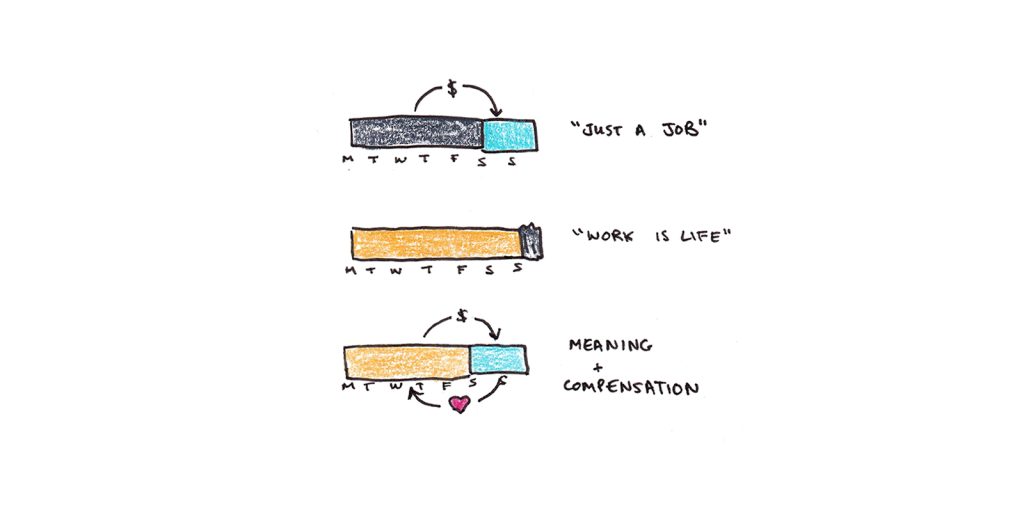This is the last lesson in a four-part series about career improvement. On Monday, Cal Newport and I will open a new session of our eight-week class, Top Performer. In case you missed them, here are the first, second and third lessons.
When it comes to work, there are a lot of different philosophies.
One is the “it’s just a job” school of thought. This viewpoint argues that work is just what you do to pay the bills, and your leisure time is what really counts.
A variation of this belief is the idea of early retirement. According to this view, work will always be drudgery, so you should try to get it over with as quickly as possible.
I don’t mean to be unfair to these viewpoints. A lot of jobs do suck. And financial independence, if you can pull it off, is certainly something to aspire to.
Yet, like it or not, work is a major part of our lives. Even if you can retire early, you’re still left with the question of what to do with those hours. A non-stop vacation sounds appealing—until you’re sitting around at 2pm on a Wednesday, all your friends are at work, and you’re left wondering what to do with your time.
Another philosophy is that work should be your “passion.” This camp argues that you should be obsessed with work and constantly driven to achieve your life’s purpose.
Although a few of us will find work so purpose-infused that we can devote our entire lives to it, this approach is unrealistic for many. Most of us will still want time for friends, family and the occasional vacation. We’d also prefer our work pays well enough that we’re not starving for the sake of chasing our passion.
My view of work seeks to moderate between these two extremes. Work is neither the sole purpose of life nor is it merely toil to be eliminated. Instead, the goal is balance. Work should be satisfying and meaningful. And work should pay well enough, and leave enough time, so that we can enjoy all the other things we value in life.

How Do You Find Meaningful Work that Pays Well?
Career satisfaction comes from finding work we can do well, for people we care about, in a setting where we have enough independence to make our own decisions.
There are many places where you can find this. It is a myth that we’re each born with a singular, inbuilt passion or purpose that we need to discover. Instead, building a successful career is primarily a matter of building up a collection of career capital that lets you do meaningful work and get paid for it.
Skills are the foundation of your career capital. If you have rare and valuable skills, you can start building a resume, portfolio of accomplishments, and network of allies who will champion your career.
Once you’ve built some career capital, you need to use it to negotiate the kind of lifestyle you want. Avoid the trap of spending it the way someone else wants you to, or failing to negotiate at all and accepting much less than you are worth. It can take courage and vision to avoid these pitfalls, but these negotiations are only possible if you have the career capital to begin with.
Building career capital, in turn, depends on understanding how skills work. The assumption that steady, uniform progress naturally accumulates with experience is wrong. Growth often spikes and stalls, depending on how much deliberate practice we extract from the environment. It depends on identifying which skills actually matter—and which don’t. Finally, it depends on consistently putting in the work of making progress rather than sporadic bursts that fizzle out before achieving anything of value.
Constructing a Vision for Your Career
Becoming a top performer doesn’t happen by accident. You need to construct a vision for what your career will look like, both in terms of the kind of job you’d like to have, as well as the career capital you’ll need to cultivate in order to get it.
For the last homework, write below about the kind of career you’d like to have, as well as the gap you see between what you’re doing now and where you’d like to be. There’s no shame in noticing the two aren’t the same, or that you have a long path ahead of you. In contrast, you may realize you’re closer than you think. Either way, developing this vision is an essential first step.
On Monday, Cal Newport and I will open Top Performer for a new session. If the ideas in these four lessons piqued your interest, consider joining the 5000+ professionals who have taken our eight-week course. Learn to stop spinning your wheels and work on the projects that help you build the career—and life—you dream of. With over fifty lessons, interactive worksheets, and a long-standing community, it’s a great place to make your vision into a reality.


 I'm a Wall Street Journal bestselling author, podcast host, computer programmer and an avid reader. Since 2006, I've published weekly essays on this website to help people like you learn and think better. My work has been featured in The New York Times, BBC, TEDx, Pocket, Business Insider and more. I don't promise I have all the answers, just a place to start.
I'm a Wall Street Journal bestselling author, podcast host, computer programmer and an avid reader. Since 2006, I've published weekly essays on this website to help people like you learn and think better. My work has been featured in The New York Times, BBC, TEDx, Pocket, Business Insider and more. I don't promise I have all the answers, just a place to start.